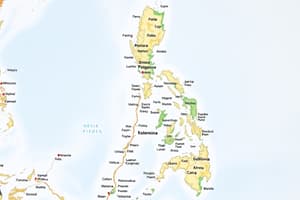Podcast
Questions and Answers
What are the main components of Araling Panlipunan?
What are the main components of Araling Panlipunan?
The main components of Araling Panlipunan are History, Geography, Economics, and Culture.
How does Araling Panlipunan foster responsible citizenship?
How does Araling Panlipunan foster responsible citizenship?
Araling Panlipunan promotes responsible citizenship by encouraging civic engagement and awareness of social justice issues.
Explain the significance of studying Filipino culture in Araling Panlipunan.
Explain the significance of studying Filipino culture in Araling Panlipunan.
Studying Filipino culture in Araling Panlipunan helps students understand their traditions, values, and the impact of globalization.
What types of assessments are used in Araling Panlipunan to evaluate student understanding?
What types of assessments are used in Araling Panlipunan to evaluate student understanding?
Describe the role of critical thinking in the Araling Panlipunan curriculum.
Describe the role of critical thinking in the Araling Panlipunan curriculum.
Flashcards are hidden until you start studying
Study Notes
Araling Panlipunan
-
Definition: Araling Panlipunan is a Filipino subject that focuses on the study of social sciences, including history, geography, economics, and culture.
-
Objectives:
- Develop critical thinking and analytical skills.
- Foster understanding of historical events and their significance.
- Promote awareness of geographical and cultural diversity.
- Encourage responsible citizenship and civic engagement.
-
Key Components:
-
History:
- Study of Philippine history from pre-colonial to contemporary times.
- Influence of colonialism and historical figures on the nation.
-
Geography:
- Understanding the physical and human geography of the Philippines.
- Importance of natural resources and environmental issues.
-
Economics:
- Basic economic concepts such as supply and demand, trade, and production.
- Overview of the Philippine economy and its global context.
-
Culture:
- Exploration of Filipino culture, traditions, and values.
- Impact of globalization on local cultures.
-
-
Skills Developed:
- Critical analysis of sources and information.
- Ability to connect past events to current societal issues.
- Engagement in discussions regarding social justice and community development.
-
Teaching Methods:
- Use of primary and secondary sources for research.
- Group discussions and collaborative projects.
- Integration of multimedia resources for enhanced learning.
-
Assessment:
- Projects, essays, and presentations to evaluate understanding.
- Quizzes and tests focusing on factual knowledge and analysis.
-
Current Issues:
- Discussions on contemporary social issues such as human rights, governance, and environmental sustainability.
By understanding these components, students can cultivate a well-rounded perspective on the social dynamics that shape their lives and communities.
Definition
- Araling Panlipunan is a Filipino subject centered around social sciences, encompassing history, geography, economics, and culture.
Objectives
- Aims to enhance critical thinking and analytical abilities.
- Encourages comprehension of historical events and their implications.
- Raises awareness of the Philippines' geographical and cultural diversity.
- Promotes responsible citizenship and civic participation.
Key Components
-
History:
- Covers Philippine history from pre-colonial eras to modern times.
- Examines the effects of colonialism and contributions of significant historical figures.
-
Geography:
- Focuses on both physical (landforms, climate) and human geography (population distribution, urbanization) of the Philippines.
- Emphasizes the importance of natural resources and the challenges of environmental issues.
-
Economics:
- Introduces foundational economic principles such as supply and demand, trade, and production.
- Provides a snapshot of the Philippine economy and its positioning in the global market.
-
Culture:
- Investigates Filipino cultural practices, traditions, and values.
- Analyzes globalization's impact on local cultures and traditional practices.
Skills Developed
- Trains students in critical analysis of various information sources.
- Facilitates connections between historical events and contemporary societal challenges.
- Engages students in dialogue about social justice and community progress.
Teaching Methods
- Incorporates primary and secondary sources for comprehensive research.
- Encourages collaboration through group discussions and projects.
- Utilizes multimedia resources to enrich the learning experience.
Assessment
- Evaluation methods include projects, essays, and presentations to gauge comprehension.
- Quizzes and tests assess both factual knowledge and analytical skills.
Current Issues
- Engages students in discussions regarding modern challenges like human rights, governance, and environmental sustainability.
- Helps cultivate a holistic view of the social dynamics influencing students' lives and their communities.
Studying That Suits You
Use AI to generate personalized quizzes and flashcards to suit your learning preferences.




